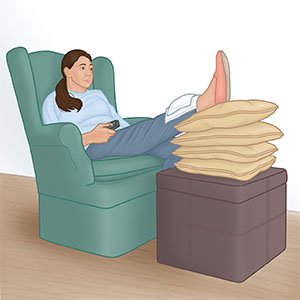Steroid Joint Injection
Medically reviewed by Drugs.com. Last updated on Feb 9, 2025.
AMBULATORY CARE:
What you need to know about steroid joint injection:
A steroid joint injection is a procedure to inject steroid medicine into a joint. Steroid medicine decreases pain and inflammation. The injection may also contain an anesthetic (numbing medicine) to decrease pain. It may be done to treat conditions such as arthritis, gout, or carpal tunnel syndrome. The injections may be given in your knee, ankle, shoulder, elbow, or wrist. Injections may also be given in your hip, toe, thumb, or finger.
How to prepare for steroid joint injection:
Your healthcare provider will talk to you about how to prepare for this procedure. He or she will tell you what medicines to take or not take on the day of your procedure. You may need to stop taking blood thinners several days before your procedure.
What will happen during steroid joint injection:
You may be given local anesthesia to numb the area where the injection will be given. With local anesthesia, you may still feel pressure during the procedure, but you should not feel any pain. Your provider may use ultrasound or fluoroscopy (a type of x-ray) to guide the needle to the right area. He or she will then inject the steroid into your joint. A bandage will be placed on the injection site.
What will happen after steroid joint injection:
You may have redness, warmth, or sweating in your face and chest right after the steroid injection. Steroids can affect blood sugar levels. If you have diabetes, you should check your blood sugars closely in the first 24 hours after your procedure.
Drugs used to treat this and similar conditions
Arcalyst
Arcalyst (rilonacept) is used to treat Cryopyrin-Associated Periodic Syndromes, Deficiency of ...
Humira
Humira is a tumor necrosis factor blocker that is used to treat many inflammatory conditions such ...
Celebrex
Celebrex is a nonsteroidal anti-inflammatory drug used to treat pain or inflammation. Learn about ...
Plaquenil
Plaquenil is used to treat or prevent malaria and to treat the symptoms of rheumatoid arthritis ...
Rituxan
Rituxan IV infusion is a cancer medicine that interferes with the growth and spread of cancer cells ...
Xeljanz
Xeljanz (tofacitinib) is an oral Janus kinase (JAK) inhibitor that may be used alone or with other ...
Enbrel
Enbrel is used to treat rheumatoid arthritis, ankylosing spondylitis, and psoriasis. Learn about ...
Meloxicam
Meloxicam is a nonsteroidal anti-inflammatory drug used to treat pain or inflammation caused by ...
Prednisone
Prednisone is used to treat allergic disorders, ulcerative colitis, psoriasis and arthritis. Learn ...
Hydroxychloroquine
Hydroxychloroquine is a quinoline drug used to treat or prevent malaria. It's also used to treat ...
Risks of steroid joint injection:
You may get an infection in your joint. The injection may also cause more pain during the first 24 to 36 hours. You may need more than one injection to feel pain relief. The skin near the injection site may be damaged and become discolored or indented. This can happen if the steroid is placed too close to your skin. A tendon near the injection site may rupture or a nerve can be damaged.
Contact your healthcare provider if:
- You have fever or chills.
- You have redness or swelling in the injection site.
- You have more pain than usual in your joint for more than 72 hours.
- You have questions or concerns about your condition or care.
Medicines:
- Pain medicine may be given. Ask how to take this medicine safely.
- Take your medicine as directed. Contact your healthcare provider if you think your medicine is not helping or if you have side effects. Tell your provider if you are allergic to any medicine. Keep a list of the medicines, vitamins, and herbs you take. Include the amounts, and when and why you take them. Bring the list or the pill bottles to follow-up visits. Carry your medicine list with you in case of an emergency.
Self-care:
- Leave the bandage on for 8 to 12 hours. Care for your wound as directed.
- Rest the area as directed. You may need to decrease weight on certain joints, such as the knee, for a period of time. Ask when you can return to your daily activities.
- Elevate your limb where the steroid injection was given. Elevate the limb above the level of your heart as often as you can. This will help decrease swelling and pain. Prop your limb on pillows or blankets to keep it elevated comfortably.

- Apply ice on your joint for 15 to 20 minutes every hour or as directed. Use an ice pack, or put crushed ice in a plastic bag. Cover it with a towel. Ice helps prevent tissue damage and decreases swelling and pain.
Follow up with your doctor as directed:
Write down your questions so you remember to ask them during your visits.
© Copyright Merative 2025 Information is for End User's use only and may not be sold, redistributed or otherwise used for commercial purposes.
The above information is an educational aid only. It is not intended as medical advice for individual conditions or treatments. Talk to your doctor, nurse or pharmacist before following any medical regimen to see if it is safe and effective for you.
Further information
Always consult your healthcare provider to ensure the information displayed on this page applies to your personal circumstances.
